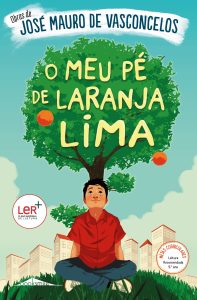Inequality Traumatizes Children:
Vasconcelos’ My Sweet Orange Tree and Poverty
By Şeyda Taşkıner

The novel written by José Mauro de Vasconcelos, My Sweet Orange Tree (1968) exhibits certain remarkable sociological issues such as poverty, starvation, and child abuse, implicitly caused by social inequality. The story is told from the perspective of the five-year-old protagonist: Zezé. In addition to being born into a crowded, poor, and underprivileged family, his father is unemployed, and all of his siblings have to be child workers except for his little brother, Luis. As a consequence, Zezé spends most of his time by himself and his overworking imagination. The reader may easily observe that he is a neglected child; in his spare time, he either puts himself in danger by jumping over moving cars or plans a number of pranks on their neighbours and put them in danger as he wanders around the streets of Rio de Janerio without the guidance or protection of an adult. In addition to being neglected, Zezé constantly gets bullied by his family members, both verbally and physically. It is a known fact that poverty breeds violence in societies and it may be concretely examined in Zezé’s family. His parents tend to be insensitive and violent as a result of being exposed to unemployment, poverty, starvation, and the psychological burden that comes with all of these. On a Christmas Night, as Zezé cries and complains about not accepting any gifts since his father is poor, his father hears him and that night turns into the most traumatic moment of his life. He, a five-year-old child goes out to polish people’s shoes to gain money so that he could buy his father a pack of cigarettes to win his heart back.
The novel also incorporates families who are from the upper class in order to emphasize the inequality between the two social classes in a more striking way. The children of the rich families are able to buy whatever they like such as new toys, bicycles, and many desserts while the children of the poor families like Zezé and his siblings have to be child labourers. He both admires and envies their toys and clothing as he was raised to believe that he does not deserve good things in life because he is told by his family that he is the devil. Zezé might be a vulgar and mischievous child, but he has a pure heart and it may be easily recognized from his behaviours at school. His teacher gives him a little money for him to buy himself lunch as the other children have their lunch boxes or money when he does not, and Zezé shares his money with other children who cannot afford lunch. It is also observable that when Zezé meets with his ”Portuguese” friend who emotionally and financially supports him, he starts to heal from his traumas and becomes a gentle, good-natured child as he starts to be able to meet the basic needs of a child or a human. My Sweet Orange Tree successfully manages to display a society unequally divided into two classes where the unlucky children are exposed to starvation, being abused, and bullied.

